News
EUFIC backs plant-based but warns consumers to check nutrition content
17 Aug 2023
The European Food Information Council (EUFIC) has shared tips to follow a healthy and sustainable diet, and has highlighted plant-based products – but consumers should be wary of potentially high levels of salt and saturated fats, it says.
Earlier this year, EUFIC brought together its understanding of health and sustainability in today’s diets by sharing nine tips on how consumers can achieve this, highlighting plant-based foodstuffs.
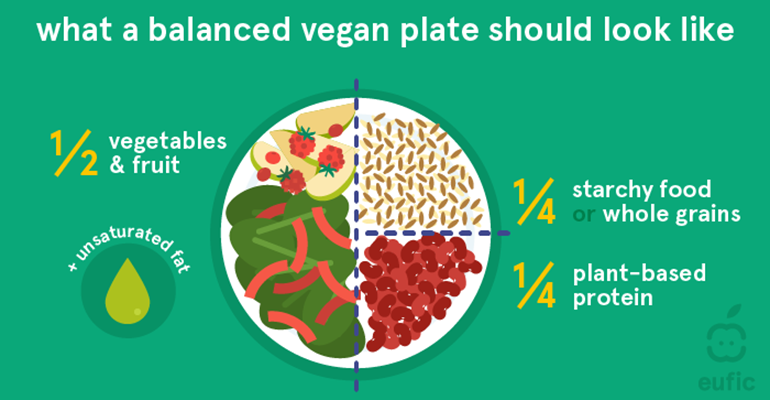
Among its guidance included recommendations to eat more fruit and vegetables, swap animal proteins for plant-based ones, choose whole grains and opt for sustainably sourced seafood. “One trend that is becoming more mainstream is plant-based meat and dairy analogues designed to look, cook and taste like meat and dairy using ingredients like vegetables, pulses, cereals, nuts and seeds,” says Nina McGrath, content production lead at EUFIC.
“However, some of these products may contain high amounts of salt or saturated fats, so it is important for consumers to continue checking labels to identify healthier options,” McGrath adds.
WHO priorities
Setting out its key European activities, the World Health Organization (WHO) published a report on healthy and sustainable diets in Europe. Consumer preferences, production systems and policies continue to evolve while public health and food systems receive calls to shift their approaches to health and sustainability.
Non-communicable diseases (NCD) such as obesity, diabetes and cancer affect the long-term health of global citizens. At the same time, current food systems significantly contribute to climate change, biodiversity loss, and fewer natural resources.
Plant-based diets are increasingly referenced as a solution to today’s health and environmental concerns. “As we face the challenge of climate change, shifting our eating habits to reduce meat consumption and include eating more plants can bring great benefits to both our health and the planet,” says McGrath.
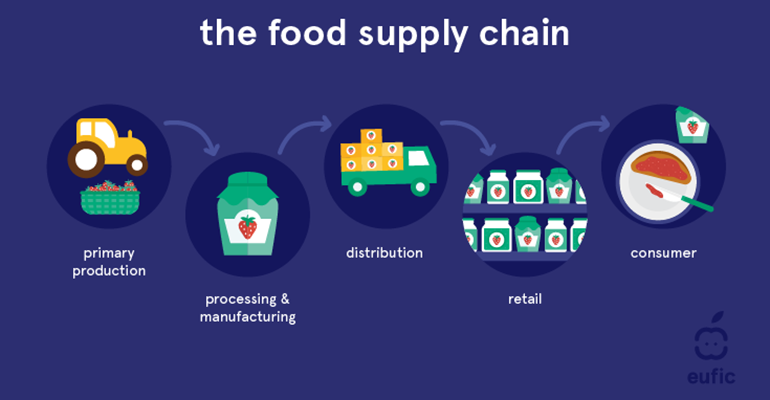 © EUFIC | The food supply chain
© EUFIC | The food supply chain
Actions to create healthy and sustainable diets
Leaders will need to redesign our global food systems to spur shifts that tackle the growing diet-related NCDs while encouraging a move towards more sustainable diets. Since the report’s release in 2021, WHO has sought to explore evidence-based actions to address obstacles to supporting and achieving healthy and sustainable diets in Europe.
Food profiling models, a data platform for modelling healthy and sustainable dietary patterns, public food procurement, nutritional shifts and plant-based food products, healthy digital food environments, food reformulation and thinking through systems in practice to gain an understanding of the interconnectivity between different parts of the system are core actions.
“Human health and planetary health are deeply interconnected,” says the WHO in the report.
“Whether it’s vegan, vegetarian or flexitarian, sustainable diets that deliver both health and environmental benefits are gaining popularity,” McGrath adds.
Forming a consistent definition
Challenges surround how to form a concrete and consistent definition of a healthy and sustainable diet and how to achieve it. In 2021, scientists explored how to build better guidelines for healthy and sustainable diets.
Citing the USDA and US Health and Human Services (HHS) department 2020–25 Dietary Guidelines for Americans, the researchers stated that these remain “animal food-centric and would require a massive increase in dairy production, along with additional fruits and vegetables (including a doubling of starch vegetables)”. Ultimately, these guidelines are not sufficient to address these challenges, the researchers stated.
Red meat has been highlighted as a key food type that is bad for our health and our environment, with the EUFIC detailing guidance on red meat and how to eat less. In a 2020 research study, scientists explain that while animal-source foods, particularly red meat, have been earmarked as a source of detrimental impact on health and the environment, they do contribute to micronutrient intake. Further, evidence has suggested that nutrient status may be insufficient when supplementation is inadequate.
“One key thing for consumers to remember is that if they choose to eliminate entire food groups such as meat or dairy, they may increase their risk of lacking certain nutrients,” says McGrath. Iron, calcium, vitamin B12, vitamin D, iodine, zinc and some omega-3 fatty acids are examples of these.
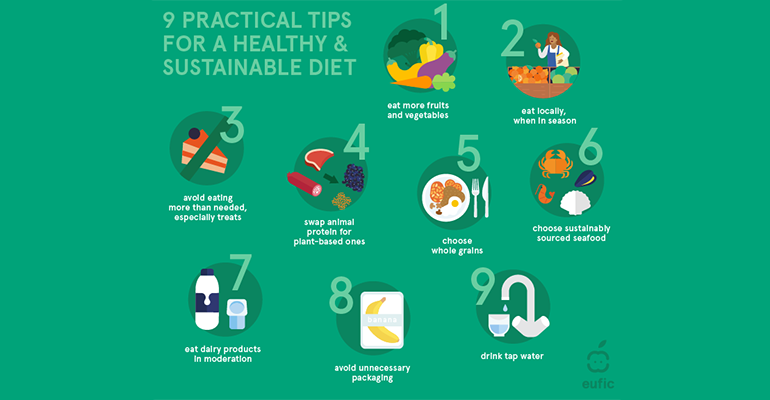 © EUFIC | 9 Practical tips for a healthy & sustainable diet
© EUFIC | 9 Practical tips for a healthy & sustainable diet
“So it’s important to pay attention to getting these from other foods they eat, fortified foods or supplements, and to consult with a registered nutritionist or dietitian to make sure they’re meeting their nutritional needs,” details McGrath.
The EUFIC released insights on plant-based nutrition and how to ensure sufficient intake in its 2022 article. Detailing tips on how to get enough protein into plant-based diets, the Council advises including cereals and legumes regularly into your diet, eating vitamin-C-rich foods, looking for fortified products, including nuts and seeds in smaller portions and soaking dry pulses for a few hours before cooking.
Alternative proteins
Alternative protein sales increased 10% annually between 2010 and 2020, with the European market’s appetite for them rising in recent years. EUFIC details the leading alternative proteins in 2023. No longer considered novel by many, these meat and dairy-free options contribute to bringing alternative protein sources to consumers’ diets and remain a popular choice among manufacturers exploring new ingredients for product development.
The non-traditional high-protein foods strive to compete with conventional animal products by offering sustainable, nutritious, and tasty protein-rich choices. Europe's five key trending alternative protein sources are plant-based meat substitutes, lab-grown meat, fermentation products such as mycoprotein, edible insects and algae. These alternative proteins aim to compete with conventional animal products.
“While some are already on the market, many still face challenges such as meeting regulatory requirements, reducing production costs, or being accepted by consumers before they stand a chance of becoming widely available,” says McGrath.
Related news
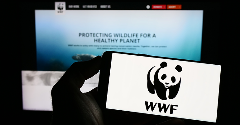
Soy story: WWF scores UK supermarkets on sustainability efforts
12 Nov 2025
WWF has published its latest “Soy Scorecard”, ranking UK supermarkets’ efforts to combat deforestation and land conversion in their soy supply chains.
Read more
Standing Ovation and Bel scale up casein production from dairy co-products
11 Nov 2025
Foodtech company Standing Ovation has partnered with cheese specialist Bel Group to manufacture dairy serums for industrial-scale casein production via precision fermentation.
Read more
New UPF standard hoped to offer consumers ‘coherence and clarity’
10 Nov 2025
Ingredients companies are being urged to enter “a new era of partnership and innovation” following the launch of the industry’s first non-UPF verification scheme.
Read more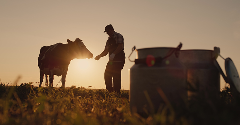
Whistleblowers accuse UK meat industry of promoting cheap, unsustainable supply
7 Nov 2025
An anonymous group of industry insiders has accused the UK’s biggest food companies of systematically driving down meat quality and welfare standards.
Read more
Bord Bia presents Irish dairy ingredient suppliers at Fi Europe
6 Nov 2025
Dairygold Co-operative Society, The Carbery Group, and Ornua Co-operative: Meet with sustainable producers of Irish dairy ingredients at Food ingredients Europe 2025, Hall 7.2 Stand M18.
Read more
AI attraction means foodtech startups must ‘prove’ rather than ‘promise’
4 Nov 2025
Reports suggest that artificial intelligence (AI) is sucking investment from foodtech and agritech, but investors say the picture is complicated.
Read more
Penguin and Club bars no longer classed as chocolate
30 Oct 2025
Penguin and Club bars can no longer be classified as chocolate after the pladis-owned McVitie’s brands turned to cheaper alternatives amid the ongoing cocoa crisis.
Read more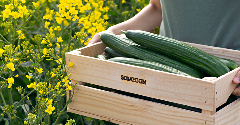
Could plant-based protection replace plastic packaging?
29 Oct 2025
Swedish foodtech company Saveggy has launched an additive-free plant-based protection for cucumbers, offering a waste-free packaging solution for fruit and vegetables.
Read more
Does promoting protein content push up plant-based sales?
27 Oct 2025
Promoting the protein content of meat-free products is a more effective sales strategy than adding carbon labels, a study of UK bakery chain Greggs suggests.
Read more
Amazon Grocery launch aims to balance quality with affordability
22 Oct 2025
Global e-commerce giant Amazon has introduced a new private-label food brand, combining existing Amazon Fresh and Happy Belly products with new everyday items.
Read more